In 1920, the 18th Amendment took effect, banning the manufacture of intoxicating liquor. And, while Western Springs had been “dry” since its earliest days, at least one household took exception.
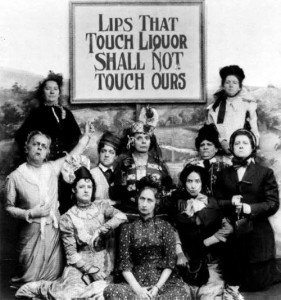
1930’s spoof of Prohibition movement
The National Prohibition Act, which took effect in 1920, banned the manufacture and distribution of alcoholic beverages. As a result, it gave rise to the illegal production of what were sometimes impure and even poisonous products. While gangland wars and graft became an everyday occurrence, many law enforcement agencies did attempt to restrict the flow of illegal alcohol.
One such incident occurred right here in quiet Western Springs.
In the late 1920s, a two-story brick residence had been built on the southeast corner of Burlington & Clausen Avenues in what was then the brand-new Ridge Acres subdivision. However, the builder apparently had trouble finding a buyer and, therefore, rented the home to a J. Jensen and family.
Since Ridge Acres was comprised mostly of empty lots in those days, there weren’t many neighbors to observe the comings and goings at the Jensen home. But on the evening of Tuesday, December 17, 1929, Chicago prohibition agents raided the residence. They discovered that the family had vacated the house the prior day without leaving a forwarding address. All of their furniture was gone, but many articles were strewn about, indicating a hasty departure.
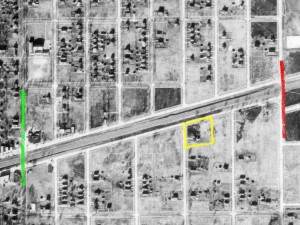
Wolf Rd (green), Jensen home (yellow), & Gilbert (red)
Despite this, the agents found that one-bedroom contained a 100-gallon still and six vats, each holding 100 gallons of a dirty yellow solution. In another bedroom, they found a dozen empty five-gallon alcohol tins, presumably waiting to be filled with illegal booze. The agents promptly smashed the still with axes, punctured all of the alcohol tins, and poisoned the mash vats, rendering them unusable.
The agents never revealed who or what prompted their raid. However, the newspapers speculated that they had been tipped off by local informants.
But, what was responsible for the Jensens’ well-timed departure? Did someone alert them to the impending raid?
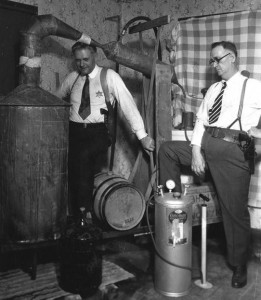
Agents seize an illegal 100-gallon still – 1930
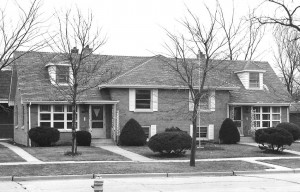
SE corner of Burlington & Clausen Ave. – circa 1970
Agents found that the bedroom where the still was located had experienced a recent fire or explosion. The ceiling and back wall were pulled away from each other, and the wallpaper, curtains, and woodwork were all scorched black. Presumably, the explosion scared the amateur distillers into leaving the area.
Today, the Jensen’s house no longer stands on the corner of Clausen and Burlington. In 1958, it was replaced by a new duplex structure, which still occupies the corner.
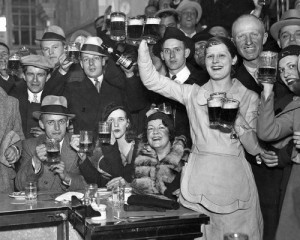
Chicagoans celebrate repeal of 18th Amendment – 1933
In December 1933, most illegal stills were dealt a death blow with the repeal of the 18th Amendment and the resulting widespread availability of alcoholic beverages. Predictably, Chicago area residents quickly celebrated the change. But, Western Springs’ local prohibition laws would endure another 65 years before the sale of beer, wine, and other alcoholic beverages would be allowed in village stores and restaurants.
